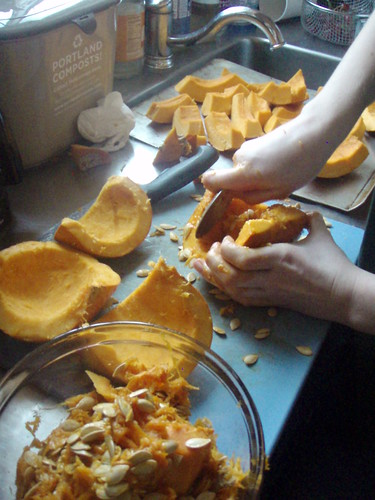One of the long running themes in these blogs has been the curriculum around "fooding" (as we say in the high Himalayas).
Cooking shows on TV are an inspiration, as are "home ec" courses, as is Food Not Bombs (FNB), a theoretical workflow I've often practiced, with skillful others, including during the Occupy chapter.
One could say we were being "more militant" but I prefer the word "disciplined". From there, I went on to haunt an abandoned building (my Ministry of Education), what would later become Revolution Hall.
My ministry wants kids involved in food logistics, cooking for groups, cooking for others, cooking for themselves, while folding in a lot of that dietary talk we get from the health care sector, regarding insulin resistance, high fructose foods, or whatever theory the school wants to showcase. You're walking your talk in the cafeteria, whatever it is. Or not, if you're lazy.
I'm not saying without adult supervision. I know a food handler's license is something worth having, adding to bragging rights. That you work in catering or delivery or cleanup or whatever it is, does not "look bad" on your academic record.
On the contrary "community service" means "cultivating a skill set" i.e. don't always mistake the admissions officer for always on the lookout for saints. No, you just need to know how to slice onions without hurting yourself, going up the rungs from there. High powered cooks are admired, even on enemy ships.
The number of roles here grows quickly, even more so their interrelationships. That we're recording the operation, making videos (say YouTubes) about our Food Not Bombs episodes, involves all the logistics of filmography, atop of those of cooking. Anarchic in this context means improvised, ad hoc, with rotation (more like in Quakerism), but not without rules and protocols. Think of sailing an old-timey ship.
I'm not suggesting every neighborhood is going to adopt a "not bombs" aesthetics, as many livelihoods depend on bomb manufacture. The goal is to mitigate waste while offering worthwhile opportunities to work out.
In my fifties, I was pulling two trailers, piled with vegetables, behind my bicycle, all the way across town, from warehouse to church kitchen. I'm not aware of many roles that actually put food on the table that also help an older guy stay sleek. I've found ways to bulk up since those days, having entered my sixties.


